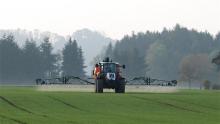Economic impact of pesticide withdrawals to Scotland, with case studies

The use of pesticides to control plant pests and diseases is a key management intervention across plant health sectors, particularly in agriculture, horticulture, and commercial forestry. Pesticide withdrawals through legislation, coupled with increased insensitivity, have emerged as key concerns for Scottish plant health stakeholders. To meet this stakeholder need, the PHC commissioned a project to quantify the impacts on Scottish plant health arising from pesticide withdrawals and set this in the context and time frame of alternative management tools (PHC2018/15: Potential Impacts Arising from Pesticide Withdrawals to Scotland’s Plant Health). The key outcomes from this project are that for all the plant health sectors (as above and including natural environment) the withdrawal of key substances will have a significant impact on the ability to manage pests, weeds, and diseases effectively and economically. For soft fruit and field vegetables in particular, production will be significantly affected and may become uneconomic. This project builds on data and results from this previous PHC project and will use case studies to understand likely impacts and their mitigation.
